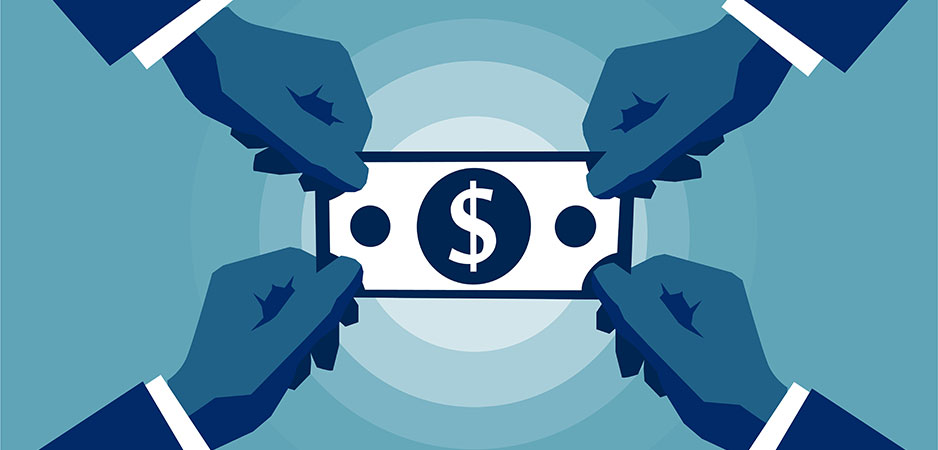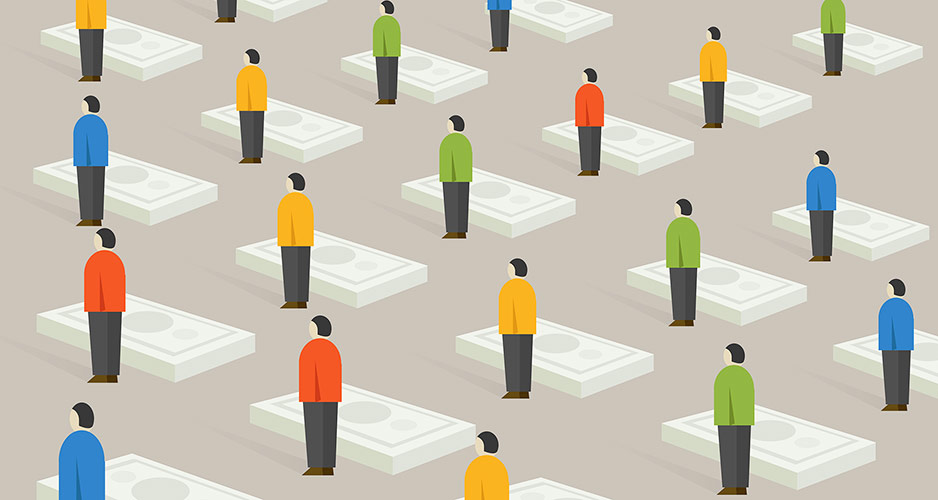With the second monumental bailout of wealthy corporations in a little over a decade, the public is beginning to discover both the shabby reality and the hyperreal absurdity of a financial practice termed “stock buybacks.” It sounds innocent, as if it described a process by which conscientious entrepreneurs are seeking to optimize their capacity to focus with as little distraction as possible on their personal vision for developing their enterprise.
Banks in Pandemic Turmoil
The reality is very different, as The New York Times explains: “By repurchasing stock, a company reduces the number of shares in the open market. The reduced supply of shares tends to push prices up.” It’s about appearances rather than economic reality. Companies are traditionally expected to use the cash they have available to build their business, support their workforce or improve their products. Stock buybacks diminish their capacity to do any of these things. Instead, they allow the management team to inflate the price of their shares while draining the company of its cash.
Now that the coronavirus pandemic has halted cash flow across much of the economy and the corporate beggar’s bowls are once again extended in the direction of Washington, The Times reassures its readers: “Buyback activity will slow dramatically, both for political and practical reasons. First, politicians are denouncing repurchases given the impending recession. Second, from a practical perspective, as revenues evaporate firms will be looking to preserve cash.”
Here is today’s 3D definition:
Stock buyback:
Technically, the purchase by a company of shares of its own stock. Psychologically, the ultimate act of narcissistic corporate self-celebration and unmitigated greed, a logical consequence of the consumer society mentality, where self-consumption becomes the ultimate goal, especially when there are ways of getting taxpayers to pick up the tab.
Contextual Note
The New York Times article provides some telling figures: “Companies in the S&P 500 stock index spent more than $2 trillion buying back their own stocks over the last three years, which helped solidify the status of corporations as the single largest source of demand for American stocks.”
The strictly monetary logic of buybacks is transparent. Matt Taibbi is the author of “Griftopia: Bubble Machines, Vampire Squids and the Long Con That Is Breaking America,” a probing analysis of the 2008 financial crisis. Commenting on the trend that accelerated following that crisis thanks to economic policies that made access to cash easier than ever, he explains the motivational logic behind board-level decision-making: “Companies buy their own stock and retire the shares, increasing the value of shares remaining in circulation. This translates into instant windfalls for shareholders and executives that approve the purchases.” It opens the door to the manipulation of stock prices and insider trading, which most people recognize as unethical if not criminal. Taibbi then signals that the “worse problem” is that those same corporations then begin to “borrow to fund even more distributions.”
For executives and shareholders, it’s win-win in the short term, though the actual economic value of the company in its marketplace is theoretically diminished by its loss of flexibility. This means that there is a risk, as becomes apparent whenever a crisis occurs. But thanks to their experience of past bailouts, they understand that the government will once again bail them out if a new crisis hits. So why worry about risk? Not only do they not need to prepare for crises, but they are free to concentrate on the one thing that matters to them: maximizing shareholder value (MSV).
C-level executives are doubly happy with stock buybacks. Their stock options (shares they haven’t yet paid for) rise in value. But they also know their board will use the firm’s share value to judge the executives’ performance. The board will accordingly reward them in salary, bonuses or more stock options. When eyes are focused on share prices alone, everything else can go awry without anyone showing undue concern.
To buy back shares, companies need money. If the company is profitable, its executives can use the cash flow from profits to buy back stock instead of investing in production capacity, innovating or diversifying their resources. Paradoxically, the more profitable such companies become, the less cash they have available to develop their business. At the same time, their financial managers and lobbyists are skilled at boosting their revenues and profits by obtaining government grants and reducing taxes. This means that, even in normal times when there are no bailouts, taxpayers are helping corporations finance their buybacks. Taibbi sums up the destructive effects of this trend: “The classic extraction trifecta was to ask for public investment, take on huge debts, and enact mass layoffs as a firm spent billions on distributions.”
In the current debate about bailing out companies suffering from the pandemic-induced lockdown, some people are calling for the government to impose draconian conditions on the behavior of companies that benefit from a bailout. This may include taking equity. Several legislators have proposed permanently banning stock buybacks.
In his typically cautious approach that demonstrates his intent of addressing immediate problems while avoiding ruffling the feathers of his corporate donors, former US Vice President Joe Biden suggests a temporary ban on buybacks. According to CNBC, “Biden calls for all American CEOs to commit to no stock buybacks for the next year as the coronavirus pandemic rages across the country.” Biden, who is the presumptive Democratic presidential nominee for the election in November, may be thinking that a year of abstinence will relieve them of their addiction.
Historical Note
Perhaps the most scandalous aspect of the buyback binge is the fact that after the 2008-09 market crash and bailout, the trend accelerated. Corporations took advantage of both the bailout money and quantitative easing to funnel money into the hands of executives and shareholders, rather than prepare their enterprise for a future in which resources created by their profits might be necessary in the face of the next crisis.
Matt Taibbi identifies the deeper problem, rooted in the history of recent economic doctrines people have been taught to accept as laws of nature. He lays the blame on what he describes as “a lunatic religion of ‘maximizing shareholder value.’” He even points out that “onetime shareholder icon Jack Welch said ten years ago it was ‘the dumbest idea in the world’ — and it’s had the result of promoting a generation of corporate leaders who are skilled at firing people, hustling public subsidies, and borrowing money to fund stock awards for themselves, but apparently know jack about anything else.”
In his most recent book, “Capital and Ideology,” Thomas Piketty examines how this “lunatic religion” emerged over the past two and a half centuries. Exploring the history of ideas that regulate social structure and property as they evolved from the Middle Ages to the present, Piketty identifies the revolutions in the US and France at the end of the 18th century as events that introduced and consolidated the culture of what he calls “proprietarism.” It’s an ideology that dominated 19th-century societies in Europe. It has now morphed, with a viral vengeance, into what Piketty calls the neo-proprietarism of a global hyper-capitalist ideology. At the heart of that ideology is the idea “sacralization” of property or ownership. That includes the “maximization of shareholder value.”
Proprietarism in the late 18th century focused on formulating laws to protect private property at a time when most property existed in the form of real estate. That changed in the 19th century when ownership of industrial property including stock became a major differentiator of wealth. The Reagan-Thatcher revolution in the final decades of the 20th century permitted the emergence of neo-proprietarism (proprietarism on steroids) that inevitably turned stock buybacks into the single most efficient means of maximizing shareholder value. In so doing it gave the final twist to a trend that consisted of perverting the notion of “value,” which underlies every society’s understanding of public ethics. But, of course, that’s what ideologies do: they set out to distort the values that define a culture, including — in this particular case — the idea of value itself.
Buybacks are not, as some might think, the fulfillment of a trend based on economic logic. On the contrary, they defeat the fundamental economic vocation of enterprises as productive entities serving the needs of society. Instead, buybacks are the direct result of ideological logic. Taibbi explains how deregulation under US President Ronald Reagan in the 1980s inaugurated the practice: “By 1997, MSV became orthodoxy, as the Business Roundtable declared that the ‘paramount duty of management and of boards of directors is to the corporation’s stockholders.’” Once a culture guided by MSV was in place, everything became financialized. And greed, once considered a cardinal sin, became a supreme value.
The final irony concerns the notion of shares themselves. The idea initially implied — at least theoretically — a relationship of involvement of members of the community in a public commercial venture, an act of “sharing” a constructive experience with founders. The theory quickly gave way to a practice that reduced the notion of sharing in the venture to the notion of sharing the profit. How that profit was made became irrelevant. The next natural step — aided and abetted by economic thinkers such as Friedrich von Hayek and Milton Friedman — was to make the notion of value synonymous with price (the monetary amount someone is willing to pay).
That’s where we are today. And this culture of buybacks is taking place within financial markets in which hedge funds are, according to Social Capital CEO Chamath Palihapitiya, levered 10 or even 15 times. As Palihapitiya points out, this didn’t seem risky in a period of low volatility but turns into an outright catastrophe when an “exogenous fact” or “externality” such as a pandemic or climate collapse occurs.
Wouldn’t it be nice if we could find a way to “buy back” the original meaning of those two key words — “share” and “value” — that give structure to all social relations? The problem is that no one knows what price to put on that purchase.
*[In the age of Oscar Wilde and Mark Twain, another American wit, the journalist Ambrose Bierce, produced a series of satirical definitions of commonly used terms, throwing light on their hidden meanings in real discourse. Bierce eventually collected and published them as a book, The Devil’s Dictionary, in 1911. We have shamelessly appropriated his title in the interest of continuing his wholesome pedagogical effort to enlighten generations of readers of the news.]
The views expressed in this article are the author’s own and do not necessarily reflect Fair Observer’s editorial policy.
For more than 10 years, Fair Observer has been free, fair and independent. No billionaire owns us, no advertisers control us. We are a reader-supported nonprofit. Unlike many other publications, we keep our content free for readers regardless of where they live or whether they can afford to pay. We have no paywalls and no ads.
In the post-truth era of fake news, echo chambers and filter bubbles, we publish a plurality of perspectives from around the world. Anyone can publish with us, but everyone goes through a rigorous editorial process. So, you get fact-checked, well-reasoned content instead of noise.
We publish 2,500+ voices from 90+ countries. We also conduct education and training programs
on subjects ranging from digital media and journalism to writing and critical thinking. This
doesn’t come cheap. Servers, editors, trainers and web developers cost
money.
Please consider supporting us on a regular basis as a recurring donor or a
sustaining member.
Support Fair Observer
We rely on your support for our independence, diversity and quality.
Will you support FO’s journalism?
We rely on your support for our independence, diversity and quality.






